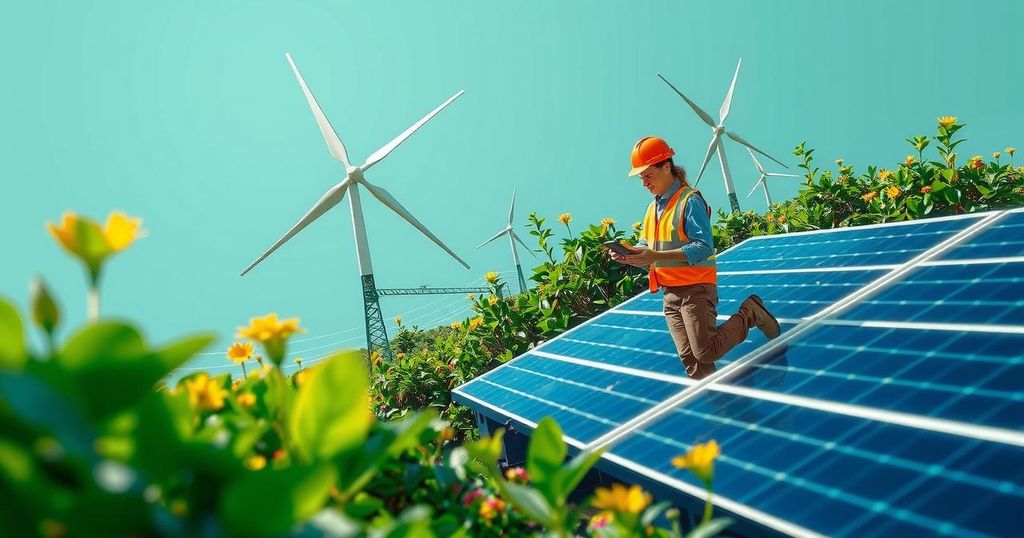Climate change
Politics
AMERICA, BIDEN, BRAZIL, CALIFORNIA, CLIMATE CHANGE, DONALD TRUMP, ELECTION, FROMA HARROP, GOLDEN STATE, HOUSE, HOUSE REPUBLICANS, IRA, JOE BIDEN, MIKE JOHNSON, NORTH AMERICA, POLITICS, PRESIDENTIAL ELECTION 2024, PRESIDENTIAL ELECTIONS, SOUTH AMERICA, TRUMP ADMINISTRATION, UNITED STATES
Leila Ramsay
0 Comments
The Unstoppable Clean Energy Transition in the United States
The article explores the unstoppable transition to clean energy in the United States, driven by the Inflation Reduction Act’s substantial subsidies for renewable energy, leading to significant job creation across the nation, especially in traditionally Republican states. It highlights bipartisan support for these jobs and the challenges posed by climate change, while noting California’s leadership in the sector amidst opposition from former President Trump’s administration.
The clean energy transition in the United States is undeniable, with widespread benefits enjoyed by citizens across political affiliations. President Biden’s Inflation Reduction Act, featuring a staggering $400 billion in subsidies for renewable energy, seeks to significantly reduce carbon emissions, a chief contributor to climate change. Notably, 60% of the new jobs created as a result are situated in traditionally Republican states, indicating a growing acceptance of these opportunities despite political rhetoric against them.
Contrary to claims that climate change is a myth, the reality of job creation through the clean energy sector is increasingly apparent, even garnering support from various Republican lawmakers who oppose the repeal of the Inflation Reduction Act. Meanwhile, major oil companies which previously supported former President Trump are now investing in clean energy initiatives, highlighting the complex relationship between traditional energy sources and the modern renewable sector.
Global leaders recognize climate change as both a security and environmental threat, as evidenced by rising sea levels and extreme weather events that affect communities nationwide. Moreover, the United States has increased its international climate financing commitments, standing at over $11 billion under President Biden’s administration.
In California, an influential force in the fight against climate change, Governor Gavin Newsom has taken proactive steps to maintain electric vehicle incentives amidst potential Republican rollbacks. California represents a critical market, accounting for roughly one-third of all EV sales in the nation, thus having the leverage to influence national trends.
Despite former President Trump’s intent to promote fossil fuel interests within Alaska’s environmentally sensitive regions, experts express doubt regarding the feasibility of such ventures amidst present economic realities. With Biden’s substantial legislation unlocking around $1 trillion for green energy innovations, the U.S. remains firmly committed to advancing the clean energy transition, irrespective of opposition. Those unwilling to embrace these new economic realities may find themselves overtaken by others ready to seize the opportunity.
The article addresses the current momentum of the clean energy movement in the United States, emphasizing the bipartisan nature of its benefits, particularly through job creation in traditionally conservative areas. It reflects on President Biden’s legislative efforts, particularly the Inflation Reduction Act, and the role states like California play in furthering clean energy initiatives. This context is crucial for understanding the economic and environmental implications of energy policies and the shifting dynamics within the American job market.
In conclusion, the drive towards clean energy in the United States is progressing rapidly, with considerable legislative backing and a growing acceptance across political lines. The job opportunities arising from the Inflation Reduction Act are significant, especially in Republican states, demonstrating that economic benefits can transcend ideological divides. California’s leadership in clean energy further highlights the evolving landscape, showing that the nation is poised to embrace renewable alternatives despite potential political resistance.
Original Source: www.creators.com




Post Comment